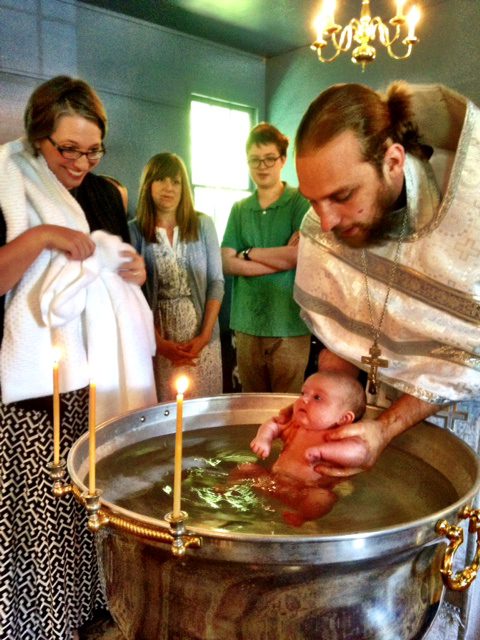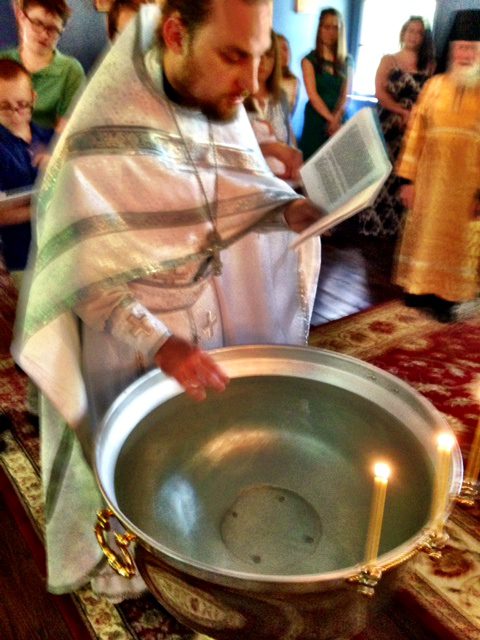Church As Place Of Mystery And Revelation
Today in our mission parish, St. John the Theologian, we had our first infant baptism. It was a beautiful, rich ceremony. That’s my wife Julie on the far left; she is Baby Anna Rose’s godmother. Anna Rose’s mom is in the center. After the liturgy, we all retired to the church hall to have refreshments (remind me to post sometime Julie’s recipe for Meyer lemon buttermilk pudding cake). We had a friendly Protestant visitor from Baton Rouge up this morning, checking out how the Orthodox have church, and a couple of us ended up in a pleasant theological discussion with him. We got to talking at one point about whether or not it is possible to have total assurance of one’s salvation, as in, “If you died tonight, do you know for sure that you would go to heaven?” I said no, it’s not possible to know for sure, because only God can judge us; we cannot judge ourselves. I think it is possible to be full of hope that one will go to heaven upon death, but ultimately, it would be presumptuous to make that call ourselves, because God knows us better than we know ourselves.
We went back and forth on this, in a friendly way, and I said that one thing about Orthodoxy is that it makes a lot of room for mystery. Orthodoxy has dogmatic theology, and doctrine, but it is remarkably (for such a conservative church) comfortable saying, “We’re not entirely sure,” or “We just don’t know.” I have found that to be both comforting and challenging, even though I have a reflexive bias against too much doctrinal liberty in this anything-goes era. It’s comforting, because it reminds me that God wants more than anything else a relationship with us; we worship a God-man who said, “I am the Way, the Truth, and the Life” — the Truth is a person, not a proposition. I think you can see why this is both comforting and challenging.
Anyway, what brought all this to mind this evening was reading Matthew Sitman’s remarks on Jessica Misener’s post about leaving Evangelicalism. Sitman, by the way, grew up in a strict fundamentalist church, which he’s not longer a part of, but he still apparently believes in Jesus Christ. He said, in part:
But most of all, Misener’s essay points to the sad state of so much American religious life, especially the messages delivered by too many Christian churches. She makes clear that, at times, she still feels “a wave of something truly ineffable, a surreal flutter in my soul that the world was vast and overwhelming and rich and meaningful and also not really fu*king meaningful at all.” That’s something most of us have felt, I’d guess, whether believer or not. It’s a pity that the brittle, ahistorical, and ultimately untenable evangelicalism she was peddled convinced her that those feelings are alien to Christianity, that faith demands the silencing of doubt and uncertainty. It’s a shame that too many Christian churches present the Bible in such a way that, when an earnest young person encounters the historical-critical approach to it, the result is shock and perplexity. It’s lamentable that more churches aren’t places where such difficulties can be worked through, where you feel welcome even if you are far from having what you believe figured out. Pope Francis has said that the Church should be a “hospital for sinners,” which is to say a refuge for all of us who struggle in all kinds of ways, profound doubt included. Misener’s story is testimony to how far Christians have to go to make the Pope’s words a reality.
There’s a book called A Place Of Healing For The Soul: Patmos, by Peter France. It’s a memoir by a BBC religion journalist who arrived on the Greek island made famous by, yes, St. John the Theologian (who wrote the Book of Revelation there) as an agnostic, and slowly converted to Orthodoxy. Here’s a lovely passage that meant something to me, in my own struggles today:
I realized that this is the essence of humility. There was a complete absence of regard for the self in the way [a group of Greek Orthodox nuns] lived. Either the work mattered or the person mattered. I had thought humility meant accepting that you did not amount to much, that you should always devalue yourself or your achievements when talking to other people. I had been influenced by the ethos of New College, at Oxford University, the essence of which is that you must never make your superiority to others apparent to them. This was essentially the English form of humility, which built the empire and realized, for a time, the prophecy that the meek would inherit the earth. But it was cant. Real humility, I learned from the nuns of Evangelismos, is not thinking yourself less than the dust. It is thinking of others so completely that you do not think about yourself at all.
France’s wife, Felicia, was a convert to Orthodoxy, but she did not pressure him to join her. They were old friends of Metropolitan Timothy (Kallistos) Ware, who had something to do with their retiring to Patmos. After some time living on the island, France felt moved to embrace Orthodoxy, but he simply couldn’t affirm the Creed, not fully. What to do? Met. Kallistos told France that it was time for him to come into the Church. If you can’t say the Creed yourself, the bishop told France, then if you trust me, I’ll say it for you.
What?! France was shocked by this. How could he trust someone else to say on his behalf words he didn’t believe? Yet he thought about how much he had come to love and to trust the Greek people on the island, and their piety. The nuns of Evangelismos had gotten to know him pretty well, and would tell his wife not to worry about Peter, because he’s already Orthodox, and just doesn’t know it. Met. Kallistos, France conceded, knew him pretty well, and probably knew more about his spiritual condition than he did.
And then I remembered the words of Robert Runcie, archbishop of Canterbury, that “Christianity is an experiment which leads to an experience which is verifiable as you go along.” I decided to start the experiment.
France begins the book describing his baptism into Orthodoxy. Later, he says that he had no shattering revelations when he arose from the water as an Orthodox Christian. In fact:
I emerged still agnostic, but with a difference. A part of me was opened that had been shut. I heard no messages, but felt ready to receive them. If I had received grace, it had come in the form of an increase not in conviction, but in awareness, in receptivity.
Very soon, after my second or third communion, I realized that I was beginning to experience as realities what I had taken to be colorful imagery. the divine energies present in the mystery of the Eucharist open within us a capacity to see, or to sense, spiritual realities to which we were insensible. That sentence is a myth for those without the experience; a reality for those who have it.
This morning, as part of the baptism ritual, Father Matthew blessed the water — here is the entire baptismal liturgy; check out how powerful these prayers are, especially those over the water — and poured holy oil into it in the sign of the Cross as he did so:
After he had done that, I felt a wave of energy rise from that water, and wash over me. Was it my imagination? Maybe. But I don’t think so. I think that I felt a spiritual reality, a phenomenon that is truly there. I last felt it in our church when the Kursk Root icon was there. For those who have not experienced this kind of thing, it’s a myth, it’s nonsense, it’s delusion. But for those who have, you know how real it is.
Last week, when Shawnee Smith and her crew were here filming for Orthodox: A Love Story, Shawnee sat with me on their last day in town, on my front porch swing and talked about all the things she and the crew had seen here in St. Francisville, both in our mission parish and in the community. (I wrote about some of this here.) She said, “I don’t know what more anybody would want out of life.” Golden times like this morning’s baptism of Baby Anna Rose, when the presence of God is so palpable you can feel it radiating off the water, bring Shawnee’s words home. I don’t have my faith all figured out; none of us in our parish do, or ever will. I doubt, I struggle, I backslide, and I do not know for sure that if died tonight, that I would go to heaven, though I hope I would, and I trust in His mercy. Salvation is a deep mystery, and the Orthodox Church is not there to make the ineffable plain, but to introduce you into the holy mysteries, so that they will heal your soul and draw you closer to mystical unity with the Holy Trinity. This is why “Do you know for sure you would go to heaven if you died tonight?” is not really an Orthodox question.
Here’s something I do know for sure: I went to heaven this morning, inside the walls of St. John the Theologian mission, and saw a baby come into the Kingdom in glory and splendor veiled by oil and water. I don’t know what more anybody would want out of life.
UPDATE: My wife just showed me this great short video that provides a clear theologically Orthodox answer to the question, “Are you saved?”



Subscribe for as little as $5/mo to start commenting on Rod’s blog.